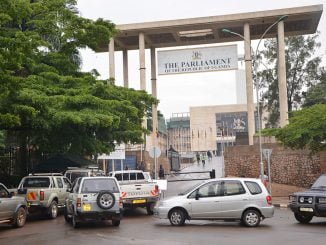
Kampala, Uganda | By Michael Wandati | The Walezi Wa Katiba Foundation and lawyer Michael Aboneka have filed a petition with the Constitutional Court, urging the Court to compel MPs serving as Ministers to vacate their positions.
The activists argue that the current practice of appointing Members of Parliament (MPs) as ministers goes against the separation of powers doctrine, designed to prevent power concentration and maintain checks and balances.
Quoting the petitioners, the Constitution emphasizes the independence of the three government branches—Parliament, Judiciary, and the Executive—each with distinct functions. The petitioners, represented by PACE Advocates, assert that MPs holding dual roles violate the separation of powers doctrine, merging the Executive and Legislative branches.
Notably, Uganda’s nineth and current Vice President, Jessica Alupo is Woman MP for Katakwi district, and Prime Minister, Robinah Nabbanja, is also currently the Woman MP for Kakumiro district. Many several MPs are also serving as Ministers.
The petitioners’ lawyer, George Musisi, highlights the financial burden, claiming that MPs serving as Ministers receive double remuneration, constituting a waste of taxpayers’ money.
Musisi states, “The double benefits and emoluments such as vehicles, fuel allowances, and per diem for trips abroad are a wasteful expenditure and contrary to public trust.”
The petition draws parallels to a past Constitutional court ruling prohibiting judges from holding executive positions before resignation.
There were earlier similar concerns about instances where the President appointed Judges to serve in positions that fall under the Executive. In 2021 the Constitutional court led by late justice Kenneth Kakuru ruled that it is illegal for a judge to be appointed to any executive or constitutional office before his/her resignation.
Kakuru’s decision was to directly affect people like the current Director of Public Prosecutions(DPP) Jane Frances Abodo, the then IGG Irene Mulyagonja, and the serving Electoral Commission chairperson Justice Simon Byabakama.
The petitioners argue that MPs doubling as Ministers create a conflict of interest, being accountable to the President as their supervisor while expected to provide independent oversight over the Executive.
The attorney general appealed to the Supreme court and secured a stay of execution order which gave the said office bearers powers to remain in the same positions save for Mulyagonja who has since returned to the Constitutional court.
In their petition filed against the Attorney General, the petitioners contend that the MPs who double as ministers are accountable to the President as their supervisor, and at the same time, they are expected to be independent and provide oversight over the same executive.
Also Read: Uganda court okays suit challenging govt failure to translate Constitution
Lawyer Aboneka, in his affidavit, contends that such a scenario contradicts the separation of powers, checks and balances, and legislative independence outlined in chapters 6, 7, and 8 of the Constitution.
Aboneka states, “That I know that a Prime Minister forms the executive arm of government under chapter 7 as the leader of government business under Article 108A (2)(a) and therefore an MP who also doubles as a Prime Minister without resigning their former role as MP belongs to two arms of government; the Legislature and Executive which is a conundrum and a fusion of both Executive and Legislature contrary to the doctrine of separation of powers, checks and balances and legislative independence,”
The petition seeks court intervention to address the alleged constitutional violations and ensure a harmonious coexistence of constitutional provisions.



